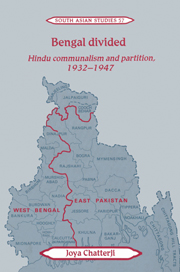Book contents
- Frontmatter
- Contents
- List of maps
- List of tables
- Acknowledgements
- List of abbreviations
- Glossary
- Map 1 Bengal districts
- Introduction
- 1 Bengal politics and the Communal Award
- 2 The emergence of the mofussil in Bengal politics
- 3 The reorientation of the Bengal Congress, 1937–45
- 4 The construction of bhadralok communal identity: culture and communalism in Bengal
- 5 Hindu unity and Muslim tyranny: aspects of Hindu bhadralok politics, 1936–47
- 6 The second partition of Bengal, 1945–47
- Conclusion
- Appendix
- Bibliography
- Index
- Cambridge South Asian Studies
Conclusion
Published online by Cambridge University Press: 04 August 2010
- Frontmatter
- Contents
- List of maps
- List of tables
- Acknowledgements
- List of abbreviations
- Glossary
- Map 1 Bengal districts
- Introduction
- 1 Bengal politics and the Communal Award
- 2 The emergence of the mofussil in Bengal politics
- 3 The reorientation of the Bengal Congress, 1937–45
- 4 The construction of bhadralok communal identity: culture and communalism in Bengal
- 5 Hindu unity and Muslim tyranny: aspects of Hindu bhadralok politics, 1936–47
- 6 The second partition of Bengal, 1945–47
- Conclusion
- Appendix
- Bibliography
- Index
- Cambridge South Asian Studies
Summary
The inwardness of Partition cannot be fully understood through a study of the motives of those in Delhi and in London who put the priorities of India and empire above the interests of Bengal. Nor do investigations into Muslim separatism tell the whole story. Partition, at least in one important province, was the considered choice of large and powerful sections of the Hindu population. When push came to shove, bhadralok Hindus preferred to carve up Bengal rather than to accept the indignity of being ruled by Muslims.
This book has attempted to challenge the prevailing wisdom about Partition on a number of counts. Partition is generally believed to have been a consequence of the separatist politics of Muslim minorities, but in the case of Bengal, Hindus evolved a parallel separatism of their own. The Congress High Command is widely (but wrongly) believed to have acquiesced only reluctantly to Partition. This study suggests that, on the contrary, not only was the Congress High Command ready to pay the price of Partition in order to strengthen its hold over an unitary India, but that the Bengal Congress campaigned successfully for the vivisection of its province on communal lines.
Many Bengalis believe that their province was a hapless pawn in the endgames of empire: that Bengal's aspirations were destroyed and her cultural integrity was sacrificed upon the altar of all-India imperatives. The United Bengal Plan is given as evidence that Bengalis actively fought against a second partition.
- Type
- Chapter
- Information
- Bengal DividedHindu Communalism and Partition, 1932–1947, pp. 266 - 268Publisher: Cambridge University PressPrint publication year: 1994



